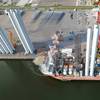Oil freight costs that have fallen sharply from record peaks two months ago are helping reduce energy import bills already eased by lower crude prices.
Tanker market experts said freight charges that rocketed to unexpected heights in November looked set to remain under control over the next six months at least.
Very Large Crude Carriers (VLCCs) delivering crude to Japan and Singapore from the Middle East now charge about Worldscale 85, $1.40 per barrel, having peaked last November at W190, $2.65 a barrel. Supertanker rates to the United States also are lower at about $2.30 a barrel from the Gulf $3.20 a barrel in November.
"More new ships will be coming in, and scrapping has slowed down, so rates will soften compared to the fourth quarter of last year, but we expect the market to remain relatively strong," said Pankaj Khanna, tanker analyst at London shipbroker SSY.
At the start of 2001 the Worldscale Association revised its flat rates upwards by around 20 percent, and this gave the impression of rates falling.
Brokers said the Chinese New Year holidays then slowed trading in January, and that, combined with talk of OPEC production cutbacks, was enough to damage tanker owners' confidence.
Tanker charterers have taken advantage by hammering rates back down, but the market's fundamentals remain sound, they said.
Oslo-based Fearnleys estimates growth in seaborne oil trade at 3.5 percent in 2001, compared to 4.5 percent in 2000. Meanwhile, the world tanker fleet is forecast to expand by 2.5 percent.
Brokers expect sentiment to recover from today's W85 to average W95 ($1.61 per barrel) on eastbound VLCC routes for the next 12 months.
Oslo shipbroker PF Bassoe said tanker supply rather than charterers' demand would dictate rates in 2001.
"Some claim we have started the inevitable downward cycle and that the next year and beyond will be painful (for tanker owners," it said in a market report.
"All we can say is look beyond temporary distortions in tanker demand. The key element over the medium term is tanker supply," says Bassoe.
SSY's Pankaj Khanna said the tanker market had a built-in safety valve, which would prevent freight falling too much further.
"In today's market, profit margins for older tankers going west from the Middle East are thin, perhaps only a couple of thousand dollars per day," he said.
"If rates fall much below W70 for those trips, then ships facing their fifth special survey (vessels turning 25 years old) are more likely to be scrapped. That will redress the supply-demand balance back in favor of newer tankers."
Volatility on some routes is expected to continue. Brokers recall Caribbean tanker rates nearly doubling in the space of one day in November.
Charterers fixing on the morning of November 8 were paying $1.19 per barrel, but those that waited until the afternoon were forced to pay $1.89 per barrel to shift their cargoes.
"It's as volatile as it ever was, perhaps more so," said one London broker. - (Reuters)
Featured videos

Inmarsat Enhances Service to Drive Digitalization

Tracking Foreign Vessels Working in the U.S. Jones Act Market

Inside the Electrified Truckable Tug
Subscribe for
Maritime Reporter E-News
Maritime Reporter E-News is the maritime industry's largest circulation and most authoritative ENews Service, delivered to your Email five times per week









